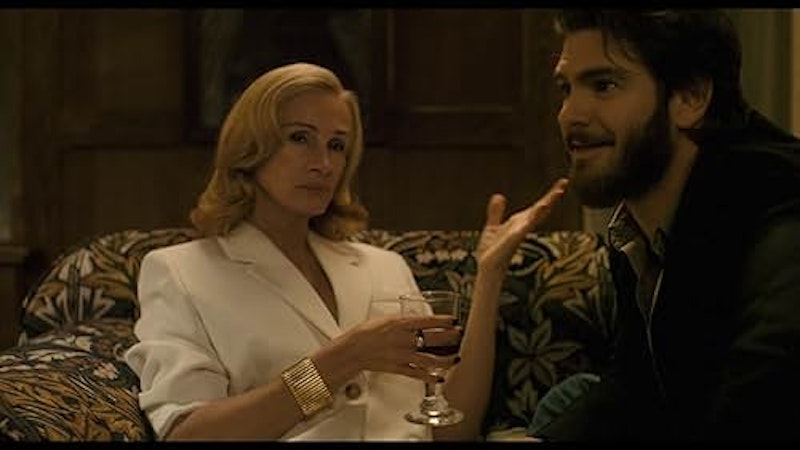The main theory presented by After the Hunt is that multiple things can be true within a controversial situation. It’s possible for a victim to be a cheater, for a trailblazer to be a narcissist, for an abuser to be a truth-teller, and for an institution to be communally beneficial and self-serving. The same philosophy can be applied to the film itself; After the Hunt may have succeeded in its goal to initiate necessary conversations, but it's also a shallow, unfocused work of provocation from a filmmaker who should’ve known better.
Luca Guadagnino is a towering figure in independent cinema because of the intimate, blood-pumping emotion he’s conjured. Guadagnino’s characters are usually obsessives; Call Me By Your Name examined the all-consuming passion of a first relationship, Bones and All showed the undeterred sensuality of two young outcasts on the run, Challengers zipped between the mania of athletes in a love triangle, and Queer centered on a middle-aged man determined to make no apologies for his identity. By comparison, After the Hunt is a strenuous melodrama about characters forced to have discussions they’ve determined to avoid; the outburst of emotion aren’t inspired by fulfillment, but by exasperation.
I wish After the Hunt presented a timeline cue early on, because the title card “five years later” that appeared before the final scene is evidence of how out-of-date the film’s discourse is. Debates about the privilege of students at liberal arts universities, the unforeseen consequences of cancel culture, and the “group think” in academic environments are ripped from headlines that are a half-decade old, and Guadagnino doesn’t have any new insights.
The inciting incident in After the Hunt is an inappropriate interaction between respected Yale University instructor Hank Gibson (Andrew Garfield), who’s accused of having “crossed the line” with his star pupil, Maggie Resnick (Ayo Edebiri). The cards are initially stacked against Hank; Maggie’s queer, black, and interested in socially progressive fields of study, whereas Hank is known to provoke inflammatory subjects at campus events, and has a drinking problem. Caught in the crossfire is Alma Olsson (Julia Roberts), a close colleague of Hank’s, who’s up for tenure. Alma must act carefully in order to honor her existing relationship, but she can’t become involved in a controversy that would jeopardize her ascension.
The question that Alma’s faced with is whether doing the right thing is more important than being perceived as being principled. She must pick a side. Although the premise has a degree of tension, Guadagnino felt the need for unnecessary melodrama. Hank’s actions have caused Alma to reflect on a similar experience in her own childhood, which she’s reminded of after Maggie’s accused of plagiarism; there’s also a subplot involving prescription pills ripped straight out of a daytime soap opera. After the Hunt doesn’t have the authenticity of Guadagnino’s previous work; the cheeky moral debates emerge through narrative contrivances that are far too neat.
The film’s almost singularly focused on Alma’s perspective, and she’s by far the least interesting character. Although the casting of Roberts as a muted, pretentious intellectual may have been an attempt to subvert the charismatic persona she established in Pretty Woman or Erin Brockovich, Alma’s passive, inactive nature is unbearable for a protagonist. Garfield’s best known for playing morally righteous characters playwright Jonathan Larson, World War II hero Desmond Doss, and Spider-Man; the decision to cast him as a smarmy womanizer feels performative.
Edebiri has emerged from the film relatively unscathed because Maggie’s persona is changed so frequently that no actress could’ve been expected to retain a consistency of characterization. The film’s best performances are from two of its background figures; Michael Stuhlbarg is comically aloof as Alma’s psychiatrist husband, Frederick, and Chloë Sevigny is appropriately feckless as Yale’s student liaison, Dr. Kim Sayers. Although it's mentioned several times that the allegations against Hank have sparked debates across the campus, there’s rarely any evidence that the controversy has existed outside of the closed circle of characters Guadagnino has focused on.
After the Hunt may have been more compelling had it leaned harder into the bizarre logical loopholes. Despite an odd use of a blaring jazz score, deliberately abrupt edits, and a few jabs at the superficiality of outrage culture, After the Hunt isn’t nearly entertaining enough to justify its narrative missteps. Like many of the “scandals” that popped up at the beginning of the cancel culture moment, After the Hunt will likely fade into obscurity.

